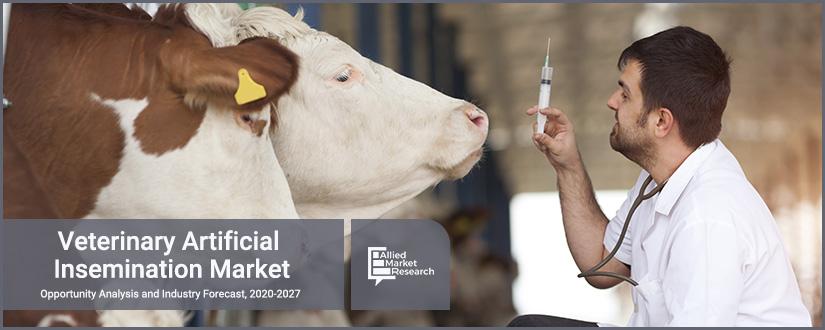Artificial insemination is defined a process for achieving the pregnancy without the sexual intercourse but by introduction of semen or sperm in female cervix or uterine cavity. It is a method in which the cattle breed using fresh, raw or frozen straw of semen. Artificial insemination is the method of achieving pregnancy of animal through in vivo fertilization. This method is also used for sperm donation and reproductive technologies and is more effective in the heat cycle of animals so that they can breed on time. Veterinary artificial insemination is great biotechnology technique for improving the genetics and reproduction of animals. The increase in the rate of genetic production and development of animals with the help of AI in different locations at different number of times is propelling the veterinary artificial insemination market growth.
Top impacting factors: Market Scenario Analysis, Trends, Drivers and Impact Analysis
Artificial insemination (AI) has been proved to be an effective treatment accessible to cattle producers, which further improves productivity and profitability of cattle operation and further associated benefits such as fewer breeding related risks are some of the major factors leading to the market growth. This method is preferred over natural mating as in this method semen is easily transported, which allow more females to be reproductive in various geographical locations and can be impregnated simultaneously. Furthermore, the semen can be stored and semen can be diluted and utilized to create multiple doses to inseminate 100 females from a single ejaculate.
As this technique is gaining popularity, most of the producers collect semen and make it accessible to other producers. The technique also gives producers the opportunity to pick what traits they want to breed into their animals. This proven and better tested technique is becoming more available across the world.
AI minimizes the risks associated with animal breeding, such as disease transmission, which is a major factor affecting market growth. The procedure of AI is considered more hygienic than natural mating. However, artificial insemination can be used for producing progenies with the desired traits.
COVID-19 scenario analysis:
The coronavirus pandemic is having a huge impact on businesses and has already caused an unprecedented collapse of economic activities. The COVID-19 impact is straining the healthcare systems globally. The rapidly increasing demand for healthcare facilities and healthcare workers may leave only a few healthcare systems to fulfill the increasing demand during the pandemic situation.
The COVID-19 pandemic cases are because of direct or indirect contact between humans. There has been no evidence or confirmation that animals can spread COVID-19 to humans. The myth animals can spread the virus to humans has increased the number of abandoned pets. Furthermore, COVID-19 has weakened the supply chain and has created shortage of animal health products such as nutritional feed as well as vaccines globally. The animal health industry has been impacted largely as many manufacturers in animal health industry are left with a significantly reduced workforce. Also, stringent government policies such as restrictions of import of raw materials from China is expected to hamper the animal health market.
Healthcare facilities are stocking up the animal related health products, considering the high demand. This is expected to further create financial strain on the market due to procurement inefficiencies. Due to the pandemic situation, many hospitals and veterinary clinics are overstocking the products.
Key benefits of the report:
- This study presents the analytical depiction of the global Veterinary artificial insemination market along with the current trends and future estimations to determine the imminent investment pockets.
- The report presents information related to key drivers, restraints, and opportunities along with detailed analysis of the global Veterinary artificial insemination market share.
- The current market is quantitatively analyzed to highlight the global Veterinary artificial insemination market growth scenario.
- Porter’s five forces analysis illustrates the potency of buyers & suppliers in the market.
- The report provides a detailed global veterinary artificial insemination market analysis based on competitive intensity and how the competition will take shape in coming years.
Questions answered in the Veterinary artificial insemination market research report:
- Who are the leading market players active in the Veterinary artificial insemination market?
- What are the current trends that will influence the market in the next few years?
- What are the driving factors, restraints, and opportunities in the market?
- What can be the challenges for global Veterinary artificial insemination market in future?
- What are the projections for the future that would help in taking further strategic steps?
Veterinary Artificial Insemination Market Report Highlights
| Aspects | Details |
| By Animal type |
|
| By Technique |
|
| By End User |
|
| By Region |
|
| Key Market Players | IMV Technologies Group, Santa Cruz Biotechnology, Swine Genetics LLC., Orgensen Labs, Revival Animal Health, ABS Global, Merck Animal Health, Jorgensen Labs, Bovine Elite, PBS Animal Health |
Loading Table Of Content...




